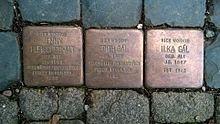Jenny Fleischer-Alt
Jenny Charlotte Fleischer-Alt , née Jenny Alt (born August 3, 1863 in Pressburg , † April 7, 1942 in Weimar ) was a German-Hungarian opera singer ( soprano ).
Life
Jenny Alt, daughter of the Hungarian doctor Leopold Alt, received her training first from Viktor Rokitansky in Vienna , then from Francesco Lamperti in Milan . In 1881 she made her stage debut at the Berlin Kroll Opera as Marie in Gaetano Donizetti's regimental daughter . In the season 1881/82 Alt sang at the Stadttheater von Würzburg , from 1882 to 1884 at the Deutsches Theater in Prague , and then for one season (1884/85) at the Hoftheater Wiesbaden . In 1885 Alt came to the Weimar Court Theater on the initiative of the Liszt student and former general manager of Weimar, Hans Bronsart von Schellendorf , where she was the first soprano. Guest performances have taken Alt to the Vienna Court Opera (1884), the Court Operas of Berlin and Munich , the Court Theaters of Kassel and Braunschweig and the Budapest Opera House . In July 1890 Alt was appointed Grand Ducal Chamber Singer by Grand Duke Carl Alexander von Sachsen-Weimar-Eisenach because of her achievements .
Alt was very successful as Carmen in the opera of the same name by Georges Bizet and also performed roles from the field of coloratura soprano , e. B.:
- the Amina in La sonnambula by Vincenzo Bellini ,
- the Gilda in Rigoletto by Giuseppe Verdi ,
- the Elvira in Die Mute von Portici by Daniel-François-Esprit Auber ,
- Martha in the opera of the same name by Friedrich von Flotow ,
- the Marguerite de Valois in The Huguenots by Giacomo Meyerbeer ,
- the Madeleine in the Postillon de Lonjumeau by Adolphe Adam ,
- the Philine in Mignon by Ambroise Thomas ,
- the Susanna in Figaros wedding of Wolfgang Amadeus Mozart and
- the Anna in La dame blanche by François-Adrien Boieldieu
In 1891 Alt married the art professor Friedrich Fleischer and withdrew from the stage. It was not until September 1919 that she resumed a professional activity and became a singing teacher at the State State Music School (until 1927). The Fleischer couple moved into the villa at Belvederer Allee 6 in 1900 .
With the death of her husband in 1937, Fleischer-Alt lost the limited protection of " mixed marriage ". Two years later, her sister Ilka Gál, who had a heart condition, and her niece Edith moved in with her. From 1939 the artist was denied access to her private accounts. In 1940 the Gestapo committed the single Jewish women Käthe Friedländer and Martha Kreiß to Fleischer-Alt's house. Her villa was now used as a "Jewish and Ghetto House". In December 1941, the cellist Eduard Rosé (co-founder of the Rosé Quartet ) joined them. Fearing deportation , Jenny Fleischer-Alt poisoned herself together with her niece Edith Gál on April 7, 1942.
Fleischer-Alt was buried in the family crypt in Jena .
Honors
In 2008 a stumbling block for Jenny Fleischer-Alt was laid in front of her former home in Weimar at Belvederer Allee 6 .
literature
- Lothar Ehrlich (Ed.): The Third Weimar. Classics and Culture in National Socialism. Böhlau, Cologne / Weimar / Vienna 1999, ISBN 3-412-15398-2 , p. 289.
- Siegfried Wolf (subject): Jews in Thuringia 1933–1945. Biographical data. Volume 1. European Culture and Information Center in Thuringia, Erfurt 2000, p. 121.
- Wolfram Huschke: Future Music. A history of the Franz Liszt University of Music in Weimar. Böhlau, Cologne / Weimar 2006, ISBN 3-412-30905-2 , passim
- Henriette Rosenkranz: "I expressly state that at my age I have no intention of emigrating ..." Injustice beyond death - the fate of the singer Jenny Fleischer-Alt, Weimar. In: Monika Gibas (Ed.): “I came to Erfurt as a wealthy person and went away as a plundered Jew.” Fates 1933–1945. (PDF; 6.7 MB). 2nd Edition. State Center for Civic Education Thuringia, Erfurt 2010, ISBN 978-3-937967-39-4 , pp. 67–74.
- Annette Seemann: Weimar. A cultural story. Beck, Munich 2012, ISBN 978-3-406-63030-9 , p. 307.
Web links
- Jenny Fleischer-Alt at Operissimo on the basis of the Great Singer Lexicon
- Jenny Fleischer-Alt in the Bavarian Musicians' Lexicon Online (BMLO)
- Ghetto house Belvederer Allee 6 on the page “Weimar under National Socialism. A city map ”.
- Jenny Fleischer-Alt. Crash into hopelessness . In: Persecution in Weimar (PDF; 2.8 MB) on the page “Weimar as a place of learning”.
Individual evidence
| personal data | |
|---|---|
| SURNAME | Butcher-Alt, Jenny |
| ALTERNATIVE NAMES | Fleischer-Alt, Jenny Charlotte (full name); Alt, Jenny (maiden name) |
| BRIEF DESCRIPTION | German-Hungarian opera singer (soprano) |
| DATE OF BIRTH | August 3, 1863 |
| PLACE OF BIRTH | Pressburg |
| DATE OF DEATH | April 7, 1942 |
| Place of death | Weimar |


